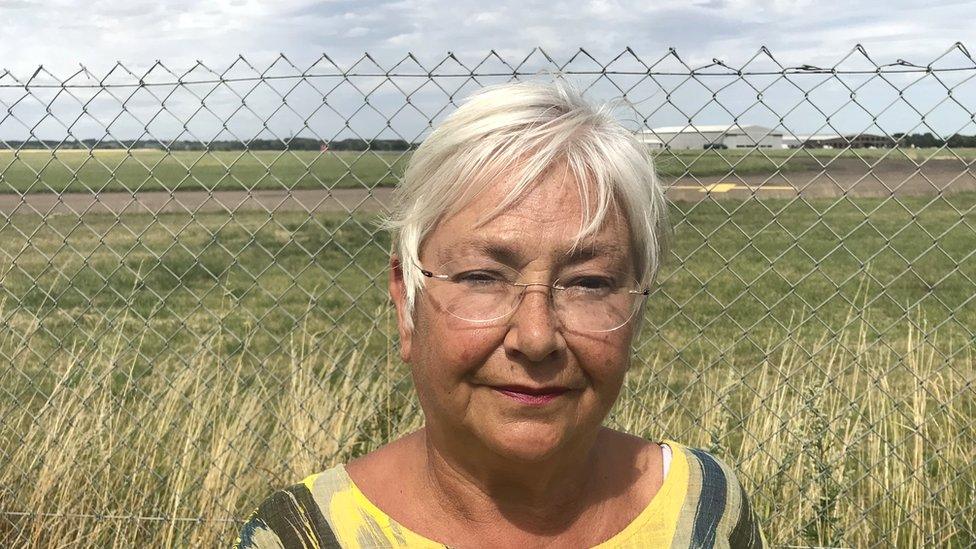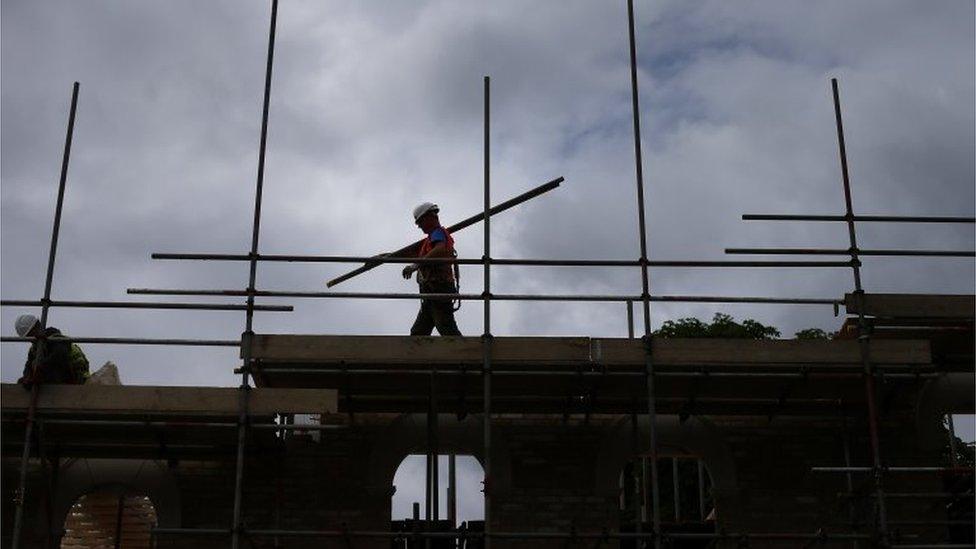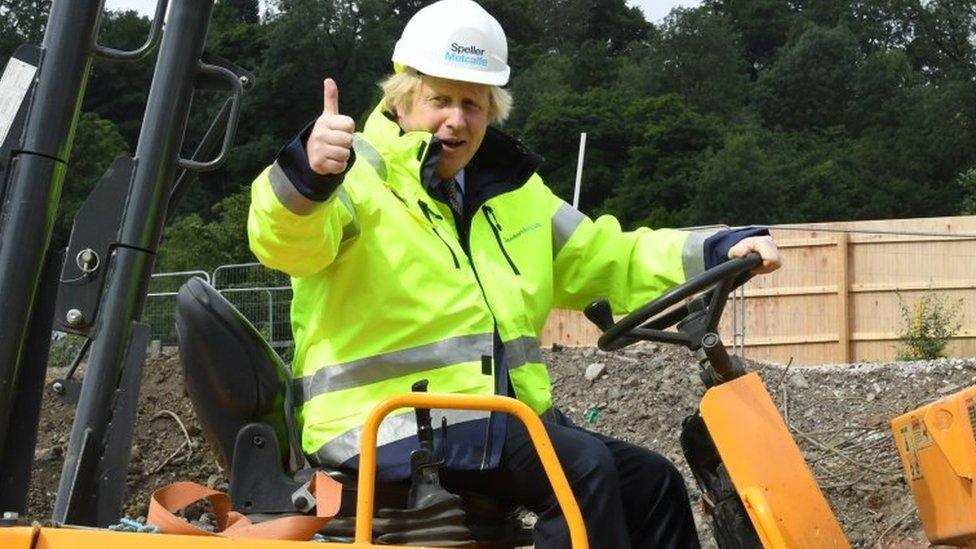Boris Johnson defends 'long overdue' planning overhaul in England
- Published
English house prices are “way, way too expensive” in comparison with France and Germany, says the PM.
Sweeping changes to the planning system in England will make it quicker to build much-needed new homes, the prime minister has said.
Boris Johnson said the plans, which aim stop local opponents blocking development in designated growth zones, were "long overdue".
Critics say the changes could lead to "bad-quality housing" and loss of local control.
The BBC's Jessica Parker said the plans had prompted disquiet among Tory MPs.
The government says it wants reduce the number of planning cases that get overturned at appeal by creating a "clearer, rules-based system".
Mr Johnson said the changes would help developers complete projects in a "more timely way" and help young people onto the housing ladder.
"We've got fantastic builders that do a great job - but for some reason or other, and planning has a lot to do with it, it takes far too long to build a home in this country," he said.
He said "more timely" completion of new project would also help young people "excluded from getting onto the property ladder".
Housing Secretary Robert Jenrick said local people would get a "meaningful say" at the start of the planning process, when local plans are drawn up, but will not be able to block new schemes after that.
He claimed local people "did not have a great deal of influence" over the current planning system and that few people engaged with it.
'Slum housing'
Mr Jenrick also wants to change the way developers contribute to the cost of building affordable housing and new infrastructure in every new project.
The government will introduce a national charge for developers - replacing the existing Section 106 agreements and the Community Infrastructure Levy - to fund projects such as schools, roads and GP surgeries, and a fixed proportion of affordable homes in a development.
Mr Johnson said the new infrastructure levy would be "much simpler" for developers and allow them to build a "much bigger chunk" of affordable housing.
But Labour leader Sir Keir Starmer said: "This is a developers' charter, frankly, taking councils and communities out of it.
"And on affordable housing, which is the critical issue, it says nothing. In fact it removes the initiatives that were there for affordable housing."
Alan Jones, President of the Royal Institute of British Architects said: "While there's no doubt the planning system needs reform, these shameful proposals do almost nothing to guarantee the delivery of affordable, well-designed and sustainable homes."
'Tory disquiet'
He said that taken together with moves to allow more commercial premises to be converted into homes without planning permission, "there's every chance they could also lead to the creation of the next generation of slum housing".
Mr Jenrick said such criticism was "complete nonsense", insisting that "design and quality" were central to the government's plans.
BBC Political Correspondent Jessica Parker said there was disquiet on the Conservative benches, external about the government's proposals, with one MP predicting "quite a battle" on the issue.
Conservative MP Geoffrey Clifton Brown, told BBC Radio 4's The World at One: "Whilst I'm all in favour of building more houses, they need to be good quality houses, we've got to be really sure we're not building slums of tomorrow by building today at low quality."
But the Cotswolds MP added that people in areas like his now realised more homes needed to be built so "their children and their grandchildren" can get on the housing ladder.


Planning rows raise high passions.
For Jacky Nabb, a proposal to build 3,000 houses near her home in the Oxfordshire countryside felt to her like "somebody just twisted my stomach".
She added: "It sounds really dramatic, but it broke my heart."
There has been a four-year battle over the prospective new town at Chalgrove - and a broader plan for local homes - with bitter political skirmishing and the personal intervention of the housing secretary.
But still, not a single brick has been laid here.

Jacky Nabb is embroiled in a local planning battle
It is exactly this sort of delay ministers want to sweep away.
Under their policy, once a local plan is agreed, developers in some places could press on with confidence.
But local Conservatives have opposed the Chalgrove plan too, just as they have many other developments.
Will the government hold firm should campaigning Tories - under fire from home-owning voters - turn on this policy?
Making yet another announcement about homes is easy. Turning it into real change will require political courage.

Under the government's proposals, which have gone out to consultation, external, land will be divided into three categories - "growth", "renewal" or "protected".
If land is designated for "renewal" councils would have to look favourably on new developments. In "growth" areas, new homes, hospitals and schools will be allowed automatically.
Areas of outstanding natural beauty and the green belt will come under the "protected" category and "beautiful buildings" will be fast-tracked through the system.
The White Paper, external proposes that all new streets should be tree-lined and "all new homes to be carbon-neutral by 2050, with no new homes delivered under the new system needing to be retrofitted".
The plans also include the "first homes scheme", to provide newly built homes at a 30% discount for local people, key workers and first-time buyers.
The chairman of the Local Government Association, James Jamieson, said the government's claim that the planning system was a barrier to house building was "a myth".
Mr Jamieson said nine out of 10 planning applications were approved by councils, but that more than a million homes given permission in the last decade had yet to be built.
Homeless charity Shelter said 280,000 homes received permission in England between 2011 and 2016 but were never built.
BBC Reality Check said there had been criticism in recent years of the amount of time it took to get planning permission, but also said many developers secured planning permission and then did not immediately build.



It's hard to be sure about these proposals from the environmental perspective because key details are missing.
One policy unifies green critics - the plan to make all homes carbon-neutral by 2050.
Labour promised to achieve that by 2016 and environmentalists condemned the later date as "pitiful".
They also fear the zoning system will do little to help the wildlife that lives outside protected areas.
The current system governed by councillors is very flexible. The zoning system would be more rigid.
Apart from that, confusion abounds.
What happens, for instance, if citizens devising their local plan decide their whole area should fall into the "protected" category? Can they reject all new homes on their patch?
If so, what's the role of the government's housing targets?
Perhaps answers will emerge. But I'm told some officials in the department think these plans have been rushed and are rather a "dog's dinner".

A number of new planning measures were announced by the government in June.
From September, home owners will be allowed to build above their properties without going through the normal planning process and developers will be able build above - or demolish and rebuild - vacant premises, or change the use of town centre shops, without planning permission.
Builders will also be allowed to convert a wider range of commercial properties into homes - despite criticism in a government-commissioned report, external that the existing policy has led to poor quality, cramped flats with low quality of life for their residents.
- Published30 June 2020

- Published30 June 2020
